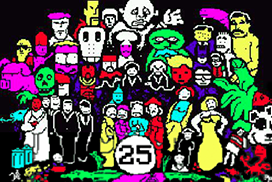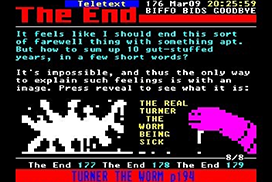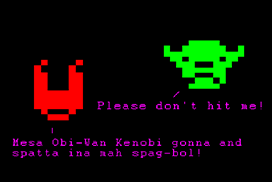
Page 28, press hold, and reveal. Digitiser's founder speaks out

|
Careers advice, Mr Biffo style
Edge #128, October 2003
Tin - that's what they give as a gift for a tenth anniversary, which underscores just how insignificant a time span a decade actually is. Admittedly you could give some achingly worthy charity a 'tin' of money, or a homeless shanty town dweller a sheet of 'tin' for his roof, both of which would significantly increase the perceived value of the tin. But none of that precludes the basic fact that, in le scheme du grande, ten years is a flob-fleck on the peeling lips of history. At least... that's what the philosophers and physicists would tell you.
"Oh, we're all just scattered blips of chance in the cosmic ballet", they'd say. "Random, sentient moments, of negligible significance to the multiverse. None of this which we perceive as our life means a fat fudgey finger, blah-de-blah, etc." But you just try telling that a laid-off 3DO, or Atari, or Commodore employee. You try explaining it to the roleplaying game companies or toy firms who've been put out of business, or seen their profits farted into the ether since 1993. Or the arcade managers who've shot themselves because they've gone bust. Or the Japanese kids that, it is claimed, suffered fits because of the Pokémon cartoon. All thanks to the blossoming of videogames as cultural phenomena.
It seems almost stupid to stress that gaming moves at a snapneck pace, but sitting here looking back over the last ten years it's almost frightening to see quite how tumultuous they've been. In many respects, the 1980s were a calmer time for gaming. The years since 1993 have seen countless companies rise then go out of business, new formats released every other week, the introduction of new genres, and technology, and new and terrifying benchmarks set in gameplay and graphical loveliness. And with all that we've seen, the rise of the whingers, those who've had their breath snatched away by the sheer force of the changes, and find themselves somewhat overwhelmed and dizzy now that their lungs have re-filled with God's rich oxygen.
See, from a certain point of view, the last decade has been a transitional period. The rise of 3D gaming, the internet, CD-ROMs, more affordable, more powerful processors, and all that guff, left the industry playing a constant game of catch-up. As much as we all may have complained at the time, the truth is that the state of flux made it an exciting time to be part of the industry. And an equally exciting - if expensive - time to be a gaming punter.
You play something like EyeToy, or Wario Ware Inc, and they're arguably the most pure, and accessible gaming experiences since Tetris; games everyone can play without needing a manual. It's as if the industry needed to lose its way, and grope around in the dark for ten years, before being able to remember what it was that made gaming great in the first place (for the purposes of this argument let us side-step Nintendo's '90s output - steadfast purveyor of unadulterated gameplay, struggling to make its classicicits' mantra audible above the din).
But now it all seems to be settling down. Call me over-optimistic, but Sony and Microsoft both seem to have long-term, cohesive plans for the future of their gaming brands (again, let's push Nintendo, and its apparently outmoded business model, to one side... doubtless its executives still come to work in their legwarmers and 'Frankie says...' t-shirts). And while we should all be happy, most of us are not. There's a culture of cynicism brewing, and it leaves a nasty taste in my mouth.
Fact: broadly speaking, gaming has never been so great. Another fact: gamers have more choice than ever. One last fact: yes, there are loads of identikit games out there, but there always will be.
So why the cynics? The double-jointed finger of blame can be jabbed in two directions at once; the gaming press and the internet. It's a given that the latter will always breed a culture of wry contempt; such is the nature of man when hidden behind an electronic wall. Unfortunately, and I fully accept my share of the blame in all this, games journalists have forgotten how to enjoy themselves. You overhear the conversations at the press launches and jollies; it's just incessant moaning. About their jobs. About the games they have to play. About how so-and-so at Whizzo PR is a fat idiot, and doesn't know what he's doing. It wouldn't be so bad if they confined their opinions among their peers, but they seem determined to force them upon their readers (and again, I'm well aware that I'm at risk of becoming Daddy Hypocrite).
Admittedly, I could be spiting my own column here; Edge ran one such feature earlier this year, speculating that gaming has become boring. But at least Edge tempers such pessimism with a genuine love of gaming. It's other publications, online and off, where you can see the bitterness seeping between every word. It's easy to see why it's happening; frankly, game journalism needs fresh blood. There are too many 30-something writers around, who really should move onto something new. A career or industry where they don't feel so jaded, don't feel as if they've seen it all.
That said, it's inevitable that they'd get that way. Who wouldn't start to take games for granted when you've spent over ten years getting them for free? Who wouldn't lose their enthusiasm when they've played their 45th ice hockey game, or struggled to find something new and insightful to say about yet another generic action heroine?
I've been there; the toughest thing I ever had to do was write a 6,000-word review on MotoGP2. Six thousand words on a motorbike game?! I couldn't get beyond the fact that all the reader needed to know was that, a) it was a game in which you raced bikes and, b) it was not bad, but not very exciting.
What I should've realised is that, to fresher eyes, MotoGP2 was brand new. Somebody out there had never played a motorbike game, and did want to hear about the replays, and the tuning screens. And it was them I should've been writing for - and as.
I got out before it was too late. Before the cynicism consumed me, and I became unable to write a review without slating some other game, or company, or individual. Consequently, having gone cold turkey for a couple of months, I've begun to enjoy games again. Without risking being glassed by some balding, pot-bellied wordsmith at the next ECTS, I'd suggest a few of y peers took a similar long, hard look at their career curve, lest they find themselves venting the same recycled bile in another ten years. Games? They're for the kids really.
Mr Biffo is a semi-retired videogame journalist. His views do not necessarily coincide with Edge's
Do you know of any important moments from the annals of Digi history that have been omitted? If so, then mail me (superpage58@gmail.com) right now, man. Credit will be duly given for anything that gets put up.










